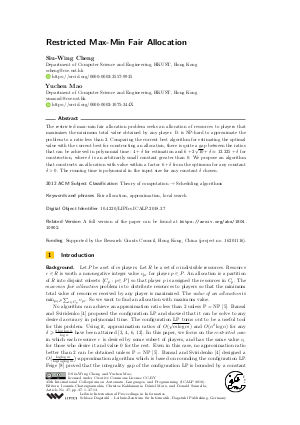Restricted Max-Min Fair Allocation
Authors
Siu-Wing Cheng  ,
Yuchen Mao
,
Yuchen Mao 
-
Part of:
Volume:
45th International Colloquium on Automata, Languages, and Programming (ICALP 2018)
Part of: Series: Leibniz International Proceedings in Informatics (LIPIcs)
Part of: Conference: International Colloquium on Automata, Languages, and Programming (ICALP) - License:
 Creative Commons Attribution 3.0 Unported license
Creative Commons Attribution 3.0 Unported license
- Publication Date: 2018-07-04
File

PDF
LIPIcs.ICALP.2018.37.pdf
- Filesize: 486 kB
- 13 pages
Document Identifiers
Related Versions
Subject Classification
ACM Subject Classification
- Theory of computation → Scheduling algorithms
Keywords
- Fair allocation
- approximation
- local search
Metrics
- Access Statistics
-
Total Accesses (updated on a weekly basis)
0Document
0Metadata
Abstract
The restricted max-min fair allocation problem seeks an allocation of resources to players that maximizes the minimum total value obtained by any player. It is NP-hard to approximate the problem to a ratio less than 2. Comparing the current best algorithm for estimating the optimal value with the current best for constructing an allocation, there is quite a gap between the ratios that can be achieved in polynomial time: 4+delta for estimation and 6 + 2 sqrt{10} + delta ~~ 12.325 + delta for construction, where delta is an arbitrarily small constant greater than 0. We propose an algorithm that constructs an allocation with value within a factor 6 + delta from the optimum for any constant delta > 0. The running time is polynomial in the input size for any constant delta chosen.
Cite As Get BibTex
Siu-Wing Cheng and Yuchen Mao. Restricted Max-Min Fair Allocation. In 45th International Colloquium on Automata, Languages, and Programming (ICALP 2018). Leibniz International Proceedings in Informatics (LIPIcs), Volume 107, pp. 37:1-37:13, Schloss Dagstuhl – Leibniz-Zentrum für Informatik (2018)
https://doi.org/10.4230/LIPIcs.ICALP.2018.37
BibTex
@InProceedings{cheng_et_al:LIPIcs.ICALP.2018.37,
author = {Cheng, Siu-Wing and Mao, Yuchen},
title = {{Restricted Max-Min Fair Allocation}},
booktitle = {45th International Colloquium on Automata, Languages, and Programming (ICALP 2018)},
pages = {37:1--37:13},
series = {Leibniz International Proceedings in Informatics (LIPIcs)},
ISBN = {978-3-95977-076-7},
ISSN = {1868-8969},
year = {2018},
volume = {107},
editor = {Chatzigiannakis, Ioannis and Kaklamanis, Christos and Marx, D\'{a}niel and Sannella, Donald},
publisher = {Schloss Dagstuhl -- Leibniz-Zentrum f{\"u}r Informatik},
address = {Dagstuhl, Germany},
URL = {https://drops.dagstuhl.de/entities/document/10.4230/LIPIcs.ICALP.2018.37},
URN = {urn:nbn:de:0030-drops-90418},
doi = {10.4230/LIPIcs.ICALP.2018.37},
annote = {Keywords: Fair allocation, approximation, local search}
}
Author Details
Funding
Supported by the Research Grants Council, Hong Kong, China (project no. 16201116).
References
-
Chidambaram Annamalai, Christos Kalaitzis, and Ola Svensson. Combinatorial algorithm for restricted max-min fair allocation. ACM Trans. Algorithms, 13(3):37:1-37:28, 2017.

-
Arash Asadpour, Uriel Feige, and Amin Saberi. Santa claus meets hypergraph matchings. ACM Trans. Algorithms, 8(3):24:1-24:9, 2012.

-
Arash Asadpour and Amin Saberi. An approximation algorithm for max-min fair allocation of indivisible goods. In Proc. 39th ACM Symposium on Theory of Computing, pages 114-121, 2007.

-
Nikhil Bansal and Maxim Sviridenko. The santa claus problem. In Proc. 38th ACM Symposium on Theory of Computing, pages 31-40, 2006.

-
Ivona Bezáková and Varsha Dani. Allocating indivisible goods. SIGecom Exchanges, 5(3):11-18, 2005.

-
Deeparnab Chakrabarty, Julia Chuzhoy, and Sanjeev Khanna. On allocating goods to maximize fairness. In Proc. 50th IEEE Symposium on Foundations of Computer Science, pages 107-116, 2009.

-
T.-H. Hubert Chan, Zhihao Gavin Tang, and Xiaowei Wu. On (1, epsilon)-restricted max-min fair allocation problem. In Proc. 27th International Symposium on Algorithms and Computation, volume 64, pages 23:1-23:13, 2016.

-
Uriel Feige. On allocations that maximize fairness. In Proc. 19th ACM-SIAM Symposium on Discrete Algorithms, pages 287-293, 2008.

-
Daniel Golovin. Max-min fair allocation of indivisible good. Technical report, Carnegie Mellon University, 2005.

-
Bernhard Haeupler, Barna Saha, and Aravind Srinivasan. New constructive aspects of the lovász local lemma. Journal of the ACM, 58(6):28:1-28:28, 2011.

-
László Lovász and Michael D. Plummer. Matching Theory. American mathematical society, 2009.

-
Barna Saha and Aravind Srinivasan. A new approximation technique for resource-allocation problems. In Proc. 1st Symposium on Innovations in Computer Science, pages 342-357, 2010.

